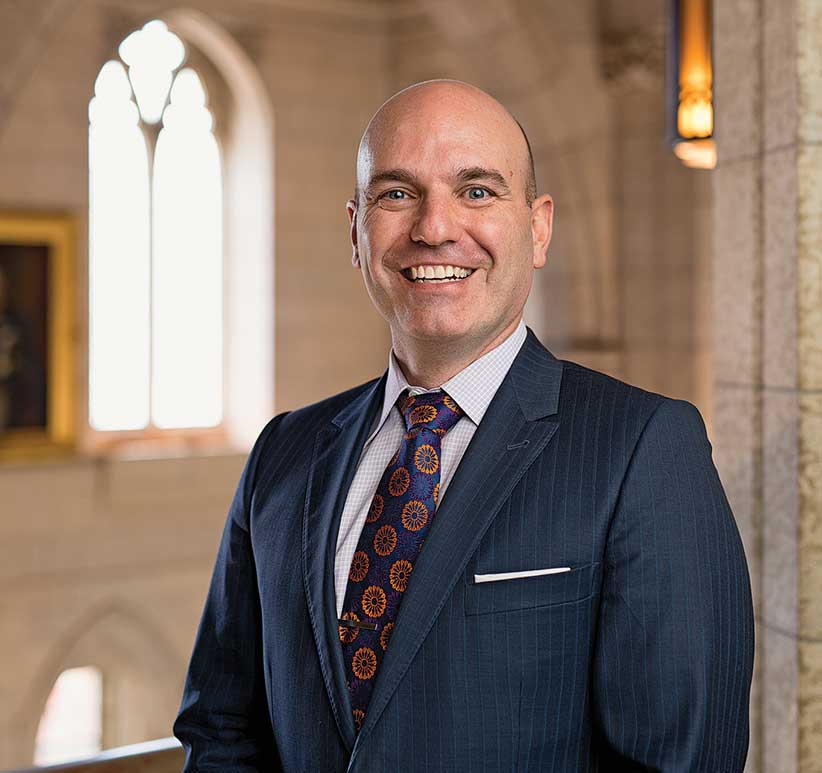Last week in what was calculated to appear as a conciliatory gesture, NDP democratic reform critic Nathan Cullen put out a press release offering to "co-draft" the electoral reform bill with new minister Karina Gould, in what he termed as the "spirit of bipartisanship." His whole release should have raised red flags, but raising the term "bipartisan" is something that should rankle, particularly if you pay a modicum of attention to how politics works in this country.
In trying to play the minister to his own ends, Cullen falls into a particular rhetorical trap that betrays a complete lack of understanding in how politics works in our democratic system. In particular, it's a signal that stems from those who adopt American political lingo without actually stopping to wonder if it actually applies under our system. Things like calling for people to be "impeached," or terms like "checks and balances" or "administration" are indications that they've spent too much time absorbing the lessons of our neighbours rather than paying attention to how things work in our own backyard. "Bipartisan" is another of those, because it's predicated on the way in which American politics works, where their political executive is divorced from their legislative branch, being Congress.
The differences between our system are precisely why "bipartisan" bills don't exist in our system, and in fact, why they should not exist. This isn't to say that governments can't or shouldn't consult and work with opposition parties to get stuff done they can and do. But there is a line that cannot be crossed when it comes to the drafting of bills, and Cullen has advocated for its breach. The drafting of government legislation is a Cabinet responsibility, which is why it's considered a Cabinet confidence. Those documents, filled with advice, are kept secret for a reason, because confidentiality is part of the system that creates cabinet solidarity, and which allows a government to speak with one voice. This is an important consideration, and it's also what allows governments to be defeated as a whole rather than have opposition parties pick off individual ministers or the PM him or herself without the rest of the Cabinet in the picture (which is how things work in other systems).
Cullen is looking to cross that divide and improperly insert himself into a government process. While he considers the drafting process to be done secretly in backrooms, it's done within the Department of Justice by expert lawyers, in confidence. Cullen is not allowed by law to enter into that process because he's not a member of the Privy Council, and hasn't taken the oath of confidentiality in order to be part of it. It's also a violation of his own role as a Member of Parliament, and just as he is adopting the Americanism of "bipartisanship," he's also taking on the American notion that he's a lawmaker when that is in fact not his role. As an MP, it's not his job to govern it's his job to hold the government to account.
This is partly why Cullen's offer is actually dangerous. Conflating his role with lawmaker diminishes his accountability role in opposition, and yes, this is a real problem. It's also, sadly, one that is becoming more common as parliamentarians increasingly demand votes on areas that are government prerogatives, like deploying troops or signing treaties. They are government prerogatives for the reason of ensuring that the government speaks with one voice, and so that they can be held to account for their decisions. That's how Responsible Government works because the government holds the confidence of the Chamber, they can act with the authority of the Crown, and the Chamber gets to hold them to account.
When the Chamber, however, starts to weigh in on those decisions, they become complicit in them. As with votes on military deployments, imagine a situation where it was the Commons and not the government who made that decision. We've seen examples in European countries where that's the case, and when those countries deployed to places like Afghanistan, their troops came laden with caveats that ensure that they would not be put into harm's way that they weren't able to engage in the tough and dangerous work that needed to be done. That's part of why it fell to Canada and the United States because our governments had the authority to go into a combat situation without the caveats tying their troops' hands. But say that our troops did go into a combat situation because the House of Commons voted to do so. And then imagine that something goes wrong as it inevitably does it becomes impossible to hold the government of the day to blame, because they didn't authorise the mission. The House of Commons did, meaning that their ability to hold the government to account (as they are supposed to) becomes drastically blunted.
Stephen Harper tried to make it policy to launder these decisions with votes of support (as opposed to authorization) in the Commons as a political ploy to implicate his opponents in the decision (as well as to divide the Liberals on the subject, which he was effective at doing). But this is also where Cullen's suggestion becomes dangerous. By inserting himself into the process, he is asking to become a willing participant in the laundering of accountability for the drafting of a bill and its disposition. While he has every intention of trying to showcase it as an example of how a coalition government might work (and trying to assert undue influence in the process to his party's benefit), what he actually winds up doing is ensuring that if and when something goes wrong and with this particular file, it can only go wrong he ensures that he won't be able to be the critic that he's supposed to be on the file. And while it may sound nice to talk about cooperation and working together, it only shields the government from accountability.
Photo Credit: Macleans






